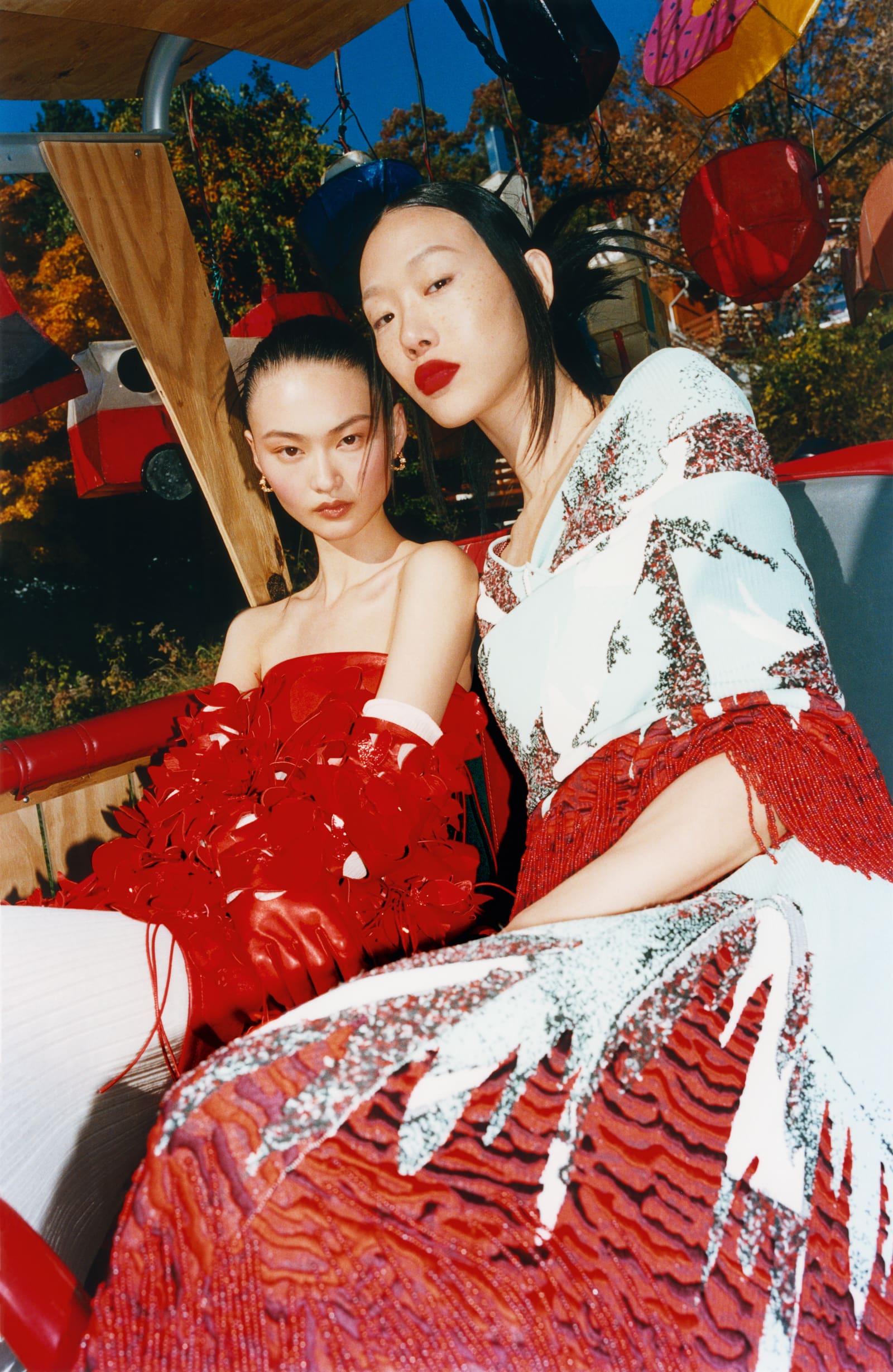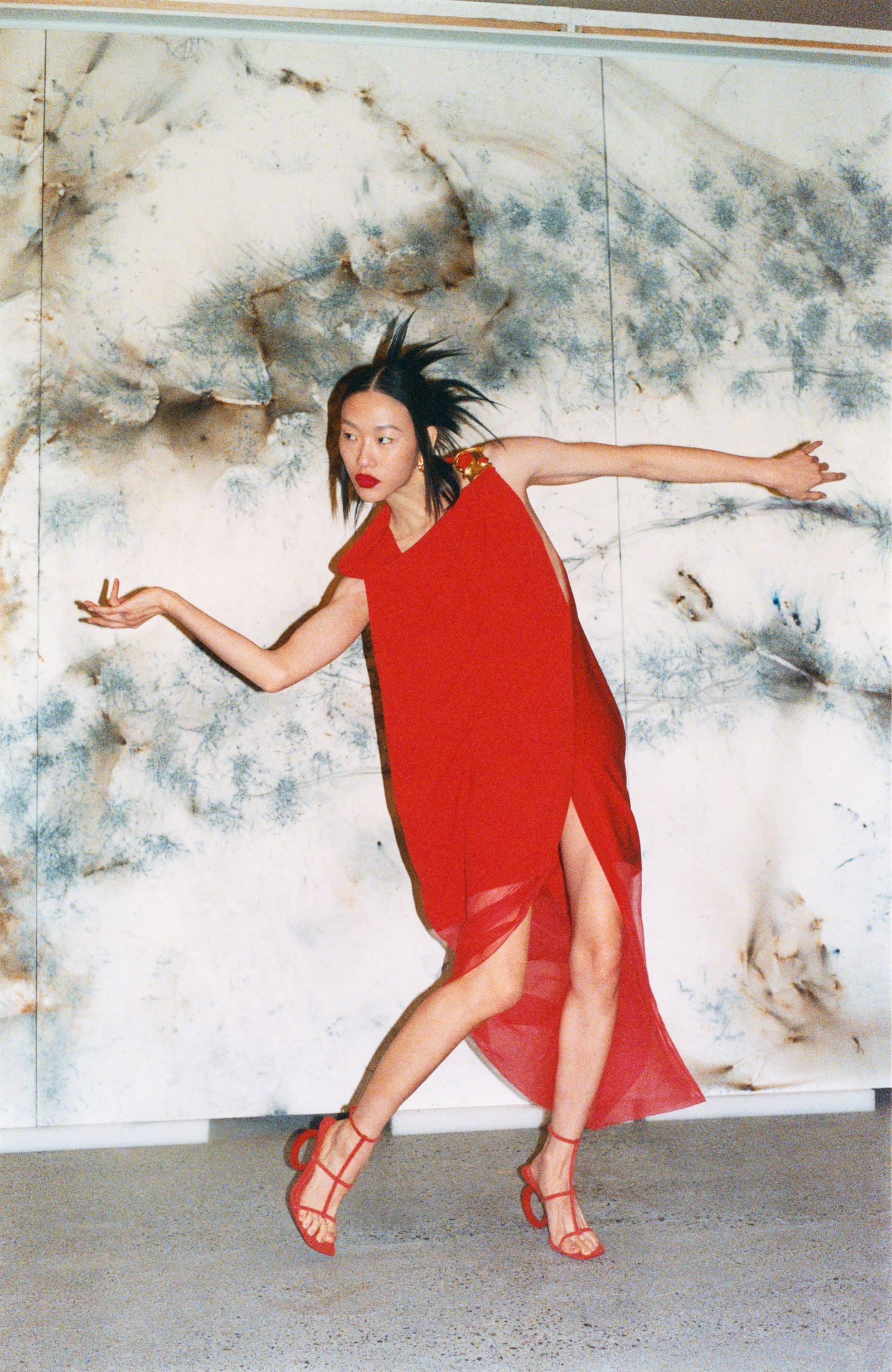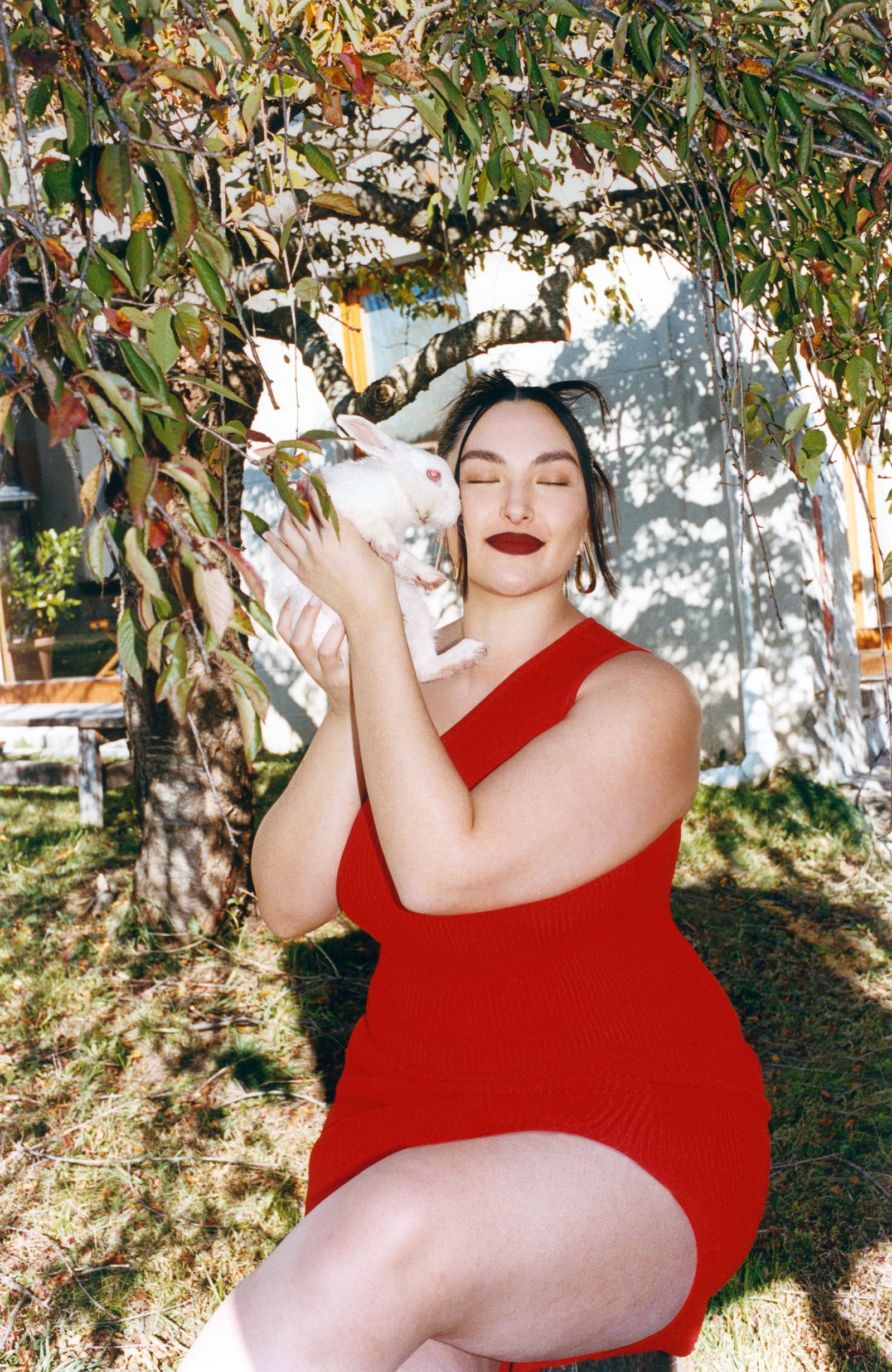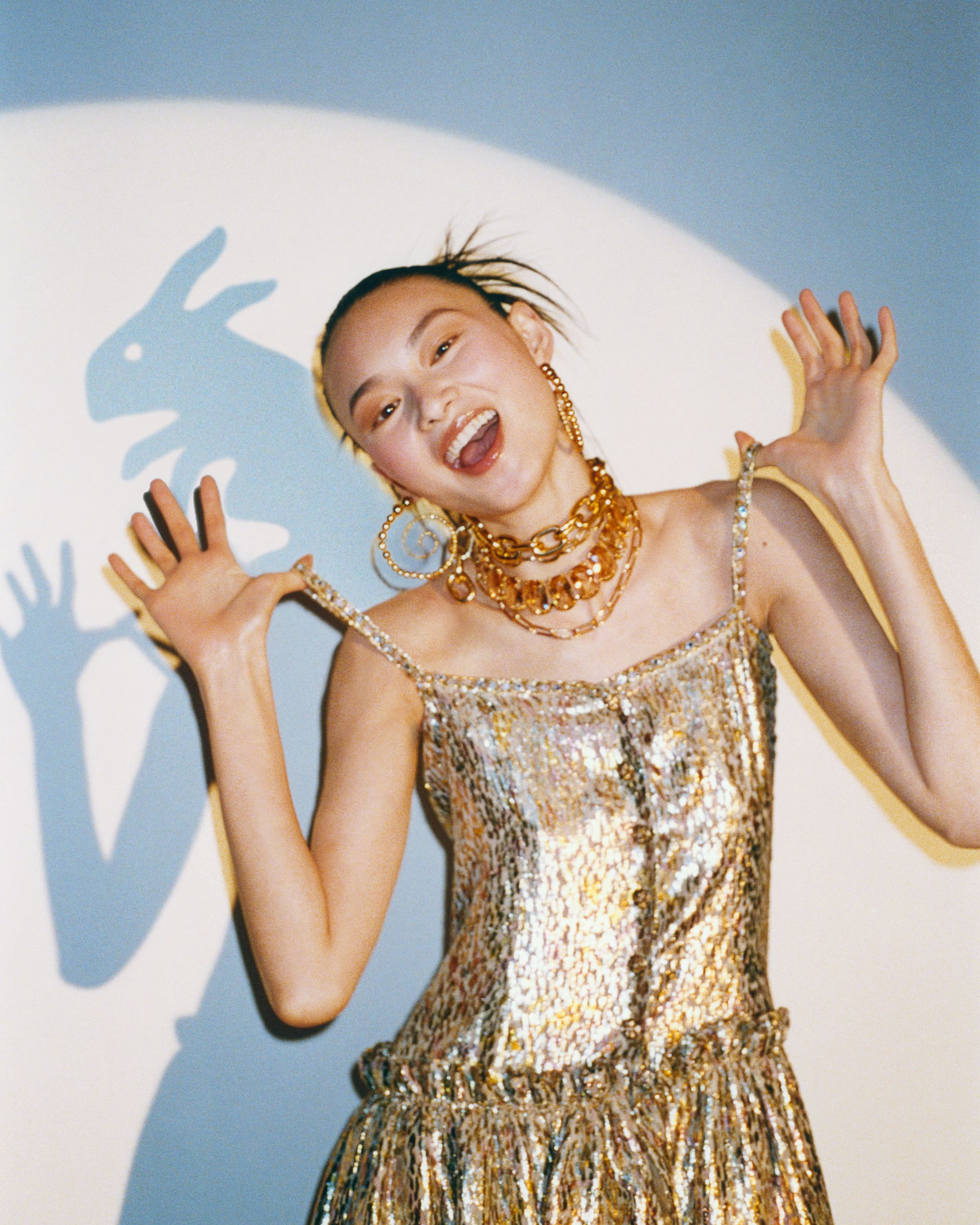SHADOW PLAY
The Year of the Rabbit begins in on January 22, 2023. Model He wears a Chanel dress. Paula Mendoza Jewelry earrings. Necklaces from Jack Vartanian, Swarovski, and Ippolita.
Photographed by Theo Liu.
When she was growing up, Lan Samantha Chang’s family declared they wouldn’t celebrate any holidays. But in the dark of winter, they rediscovered the joy and renewal of the Lunar New Year.
My preparations for each Lunar New Year begin in the bathroom. On Lunar New Year’s Eve, I turn on the hot water and let the air fill with steam. With my bare toes curled against the chilly floor, I scissor off a lock of hair, clip my nails, and discard these symbolic crumbs of bad luck into the trash. Then I get in the shower, where I suds and scour and scrub down every inch of skin.
“You have to wash off all of the bad luck from the year before.” This was my mother’s imperative, as if bad fortune could accumulate into a grungy layer over the course of the year. As if I had one chance—a crucial opening on a February night—in which it would be possible to get rid of it.

In a pedicab from Fireflies, He wears a Bottega Veneta dress, gloves, and earrings. Choi wears a Bottega Veneta top and skirt.
Photographed by Theo Liu.
The cleanse on Lunar New Year’s Eve is one of many customs—really, superstitions—taught to me by my late mother and father. It’s part of a larger idea that everything should be immaculate, including the body and the home, which should also be tidied and, most importantly, swept out. This is done to lay a perfect groundwork for the coming year: spotless and unblemished by past trouble. A vision of an annual opportunity, of incremental growth, was a fundamental part of my parents’ Chinese lives long before the 1950s, when they put these lives behind them to face a new existence in the US.
My parents’ catalog of rituals must contain only a fraction of the traditions followed by Lunar New Year’s billion celebrants worldwide. But my mother and father were firm about what they believed. We must eat certain lucky foods: labor-intensive sweet-rice-and-red-bean cakes; steamed dumplings; a whole fish covered with ginger and scallions; and lots of fruit, including, especially, oranges and lychees. The lychees, my mother warned, should not be paired with crabmeat—a bad combination, a dangerously “cold” shock to the system, possibly fatal. And we should never make soup because “if you serve soup on New Year’s, it will rain on every special occasion for the rest of the year.” When we had a rare meal out, we went to my parents’ favorite local restaurant, Bao Ju, in Neenah, Wisconsin. It was named after the Chinese word for firecrackers, which were set off on the New Year to chase away evil spirits. The phone number of the restaurant contained several eights; eight was a lucky number, as was nine, whereas four, the unluckiest number of all, should be avoided.
My parents wished so fervently for luck in the New Year. For good health, of course, but especially for money. And so bits of cash were exchanged, to encourage an increase of fortune. We children thanked our older relatives for annual red envelopes that were sent to us by mail. On the second day of the New Year, my father or mother would usually bundle up in something red and hurtle him or herself into the glacial Wisconsin winter, walking, “in all directions,” in an attempt to encounter the Money God. Such a meeting, I was told, would result in a rich year. My questions about this ritual were met with a dead end. “What does the Money God look like?” I asked my mother. “No one knows.” “Will the Money God appear as a person? Is it an inanimate object?” “I don’t know.” “What are the other gods?” Silence.
Thus my parents shut down my questions whenever I tried to cross-examine them about these protocols. I was lectured on the value of a “rational” Western education. They insisted superstitions were for the ignorant and they would sometimes scold me for even mentioning such topics. I learned to keep my mouth shut and my ears open. My sisters and I overheard my father and mother, behind closed doors, discussing in hushed voices our strengths and weaknesses as students and daughters, referring to our birth animals from the Chinese zodiac. When one of us entered the room, they would immediately stop talking. Maybe they didn’t want us to know of their belief in the irrational; maybe they wanted to protect us from succumbing to fatalism. After I left home for college, my mother would phone me on the holiday to deliver Lunar New Year prognostications for my sisters and myself. If a bad year was coming, I should wear a red bracelet. She claimed the predictions were oddities from the Chinese newspaper. She said she didn’t believe any of it. But if I waited long enough, she would drop bits of information denoting genuine concern for me or one of my sisters—that women born in the Year of Dragon (myself) marry late, for example, and that Horse women (my oldest sister) never marry at all.
Decades later, now that both of my parents are gone, I wonder why their New Year practices were so steeped in superstition. My mother and father had US college educations and my father held a master’s degree in engineering from Columbia University. They each claimed a Western rationality. Did they actually believe that taking certain, ritual actions portended good luck? It’s now too late to ask. My mother died in 2014, and my father died in 2020, outlasting her at age 97.
“It’s part of a larger idea that everything should be immaculate, including the body and the home, which should also be tidied and, most importantly, swept out”
Of course, my parents longed for money—they had four children and my father’s salary as a researcher didn’t cover extras. As they were unable to afford childcare, my mother stayed home with us. We never ate at McDonald’s. My sisters learned to sew their own prom dresses. When my youngest sister started school, my mother began to work, giving piano lessons in our living room. But as we grew, new financial challenges evolved: transportation, books, tuition.
To my mother, I think, the desire for money must have been a way to manage her anxiety over even larger uncertainties: What would become of her poor health, my impractical career choices, the lack of clarity in my sisters’ and my romantic lives? Maybe in the New Year, I would finally start to make some money as a writer. Maybe I would meet the perfect man: a Monkey or a Rat. Born only 40 years after the end of foot-binding, my mother had studied psychology before she married my father, raised us, and eventually made a career as a respected teacher. She had one of the most open minds I’ve known. But in addition to her belief in the value of education and environment, she held a deep need to assume some power outside of herself. She possessed a kind of fatalism that had emerged, I am guessing, during the constant wishing and hoping through her childhood in wartime China and, later, in the US as an impoverished student with no family support.
My father, a chemical engineer, had worked hard for an education in Western science. He generally scoffed at old customs, keeping his silence on this subject. And yet, he didn’t contradict anything my mother said about it. With a child’s instinct, I sensed he believed in the superstitions my mother explicitly asserted. Even then, I knew my father was more afraid of the power of bad luck than he was hopeful for good luck. He had grown up in mainland China under the Japanese occupation, and had been homeless in a war, before he turned 19. He had gone hungry. The prolonged, high-wire act of his life was arriving in this country at age 30 with nothing, raising a family on an inadequate salary, and somehow managing to put all four of his daughters through Ivy League colleges. As a parent now myself, I can see he took responsibility for our lives, and so his fear of bad fortune was embedded in some deeper, more elemental part of his nature. His fear was the bedrock of the nightmares he suffered since I can remember.

Backed now by Cai’s elaborate Welcoming Pine: Project for the Winter Olympics Opening Ceremony (2022), Choi kicks up her heels in an asymmetrical Ferragamo dress and shoes; ferragamo.com. Ariana Boussard-Reifel x Jason Wu earring.
Photographed by Theo Liu.
When they first came to Wisconsin—that desolate, frozen tundra—my mother and father decided to have no family holidays at all. They didn’t believe in American customs. The idea of a fat white man in a red suit sliding down the chimney was entirely bizarre to them. As for Lunar New Year, celebrated by more people than any other holiday in the world, almost no one in Appleton, Wisconsin, knew the slightest thing about it. The gathering of family, the making of sticky rice cakes, the noise and celebration of the New Year in diasporic communities all over the world meant nothing to the people around us.
But after a year, my parents realized how important it was to have something to look forward to. Our family began to celebrate not only the Lunar New Year, but Christmas and Thanksgiving as well. With the arrival of more Chinese families in our town, we gathered with them for a big meal on New Year’s Eve. My mother exchanged rumors on the coming year’s horoscopes with the other mothers, finding a lot to discuss even after my oldest sister, the Horse, was happily married.
Now, as a Chinese American living and teaching at a university in the Midwest, Lunar New Year is a cultural holiday I observe and try to share with my coworkers, friends, and family—a cause for celebration in the coldest, darkest part of winter. I accept my parents’ customs as a way of showing my love for them, my loyalty to them and their experience. Because I live in another small Midwestern city, celebrating Lunar New Year has meant learning to share my rituals with people I love to whom the traditions are not familiar. I’ve also explained these customs to my biracial daughter, who is one generation more removed from my parents and their world.
This New Year’s Eve, I don’t know if I’ll have time to clean the house. But I will set aside an hour for my bathroom ritual. I’ll schedule family haircuts, and send emails reminding non-Chinese friends to wash, clip, and snip. And even though next year will not be a Dragon year, I’ll rifle through the cabinets at work to dig up a worn stuffed dragon, the gilt rubbing off its wings, that was given to me as a New Year gift by a beloved and now deceased mentor. I’ll invite interested students to help me throw a party. We’ll decorate the place with the dragon, red signs, cartoon animals, and streamers. We’ll buy oranges and gold foil–covered chocolate coins. Then we’ll host a big, boisterous Chinese lunch. Everyone will eat, make noise, and scare away demons. They’ll take out their phones and look up their birth animals, and try to predict what will happen to them in the Year of the Rabbit. The following day, I will put on something red, so the Money God can see me, and I will go outside to walk in all directions.

Cuddling up to a darling new friend, model Yumi Nu shows off her one-shoulder Michael Kors Collection dress; michaelkors.com. Jennifer Fisher earrings.
Photographed by Theo Liu.
Lan Samantha Chang is the author of the novel The Family Chao.
